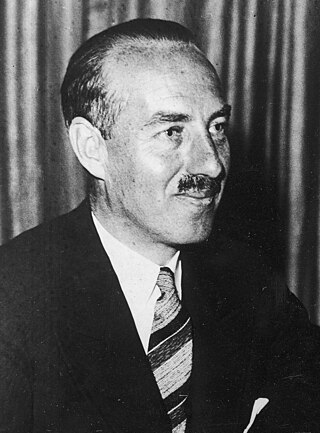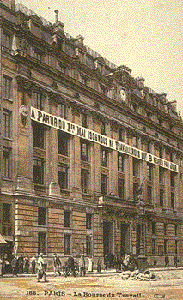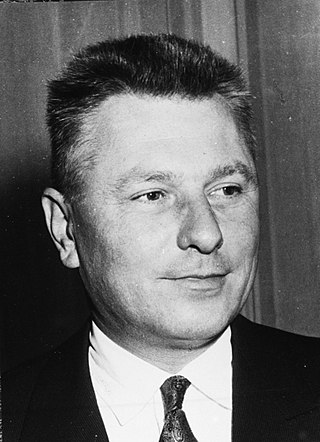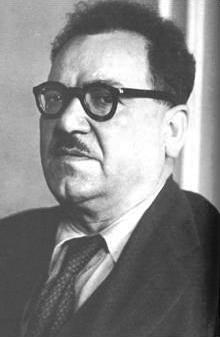
Paul Guillaume, Viscount van Zeeland was a Belgian lawyer, economist, Catholic politician and statesman.

The General Confederation of Labour is a national trade union center, founded in 1895 in the city of Limoges. It is the first of the five major French confederations of trade unions.
The Matignon Agreements were signed on 7 June 1936, between the Confédération générale de la production française (CGPF) employers' organization, the CGT trade union and the French state. They were signed during a massively followed general strike initiated after the election of the Popular Front in May 1936, which had led to the creation of a left-wing government headed by Léon Blum (SFIO). Sometimes referred to by legal scholars as the "Magna Carta of French Labor", these agreements were signed at the Hôtel Matignon, official residence of the head of the government, hence their name.

The Bourse du Travail, a French form of the labour council, were working class organizations that encouraged mutual aid, education, and self-organization amongst their members in the late nineteenth and early twentieth centuries.
LIP is a French watch and clock company whose turmoil became emblematic of the conflicts between workers and capital in France.

Paul Bairoch was a Swiss economic historian of Belgian descent who specialized in urban history and historical demography. He published or co-authored more than two dozen books and 120 scholarly articles. His most important works emphasize the agricultural preconditions necessary for industrialization and controversially claim, contrary to most scholars that colonization was not beneficial to colonial empires. He argued that tariffs and growth were positively correlated in the 19th century.
Trade unionism is a powerful force in the politics, economy, and culture of Senegal, and was one of the earliest trades union movements to form in Francophone West Africa.
The history of Wallonia, from prehistoric times to the present day, is that of a territory which, since 1970, has approximately coincided with the territory of Wallonia, a federated component of Belgium, which also includes the smaller German-speaking Community of Belgium. Wallonia is the name colloquially given to the Walloon Region. The French word Wallonie comes from the term Wallon, itself coming from Walh. Walh is a very old Germanic word used to refer to a speaker of Celtic or Latin.

The International Federation of Trade Unions was an international organization of trade unions, existing between 1919 and 1945. IFTU had its roots in the pre-war IFTU.

André Renard was a Belgian trade union leader who, in the aftermath of World War II, became an influential figure within the Walloon Movement.

The general strike of 1960–1961, known popularly in Wallonia as the Strike of the Century, was a major series of strikes in Belgium which began on 14 December 1960 and lasted approximately six weeks.

The royal question was a major political crisis in Belgium that lasted from 1945 to 1951, coming to a head between March and August 1950. The question at stake surrounded whether King Leopold III could return to the country and resume his constitutional role amid allegations that his actions during World War II had been contrary to the provisions of the Belgian Constitution. The crisis brought Belgium to the brink of a civil war. It was eventually resolved by the abdication of Leopold in favour of his son King Baudouin in 1951.
In labour law, unfair dismissal is an act of employment termination made without good reason or contrary to the country's specific legislation.
A general strike is a strike action in which participants cease all economic activity, such as working, to strengthen the bargaining position of a trade union or achieve a common social or political goal. They are organised by large coalitions of political, social, and labour organizations and may also include rallies, marches, boycotts, civil disobedience, non-payment of taxes, and other forms of direct or indirect action. Additionally, general strikes might exclude care workers, such as teachers, doctors, and nurses.

Benoît Frachon, a French metalworker and trade union leader, was one of the leaders of the French Communist Party and of the French Resistance during World War II (1939–45). He was Secretary-General of the Confédération générale du travail (CGT) from 1945 to 1967.

The Confédération générale du patronat français was a French manufacturers' association during the last years of the French Second Republic from 1936 to 1940. It supported the rights of patrons and opposed trade union activity other than discussion of factory workplace conditions. In the lead-up to World War II (1939–1945) the CGPF resisted organizing industry to prepare for war.
The Union of Belgian Metalworkers (Dutch: Centrale der Metaalindustrie van België, CMB; French: Centrale de l´Industrie du Métal de Belgique is a trade union representing workers in metal and related trades in Belgium.
Anarchism spread into Belgium as Communards took refuge in Brussels with the fall of the Paris Commune. Most Belgian members in the First International joined the anarchist Jura Federation after the socialist schism. Belgian anarchists also organized the 1886 Walloon uprising, the Libertarian Communist Group, and several Bruxellois newspapers at the turn of the century. Apart from new publications, the movement dissipated through the internecine antimilitarism in the interwar period. Several groups emerged mid-century for social justice and anti-fascism.

The Canadian Labour Revolt was a loosely connected series of strikes, riots, and labour conflicts that took place across Canada between 1918 and 1925, largely organized by the One Big Union (OBU).
The general strike of 1932 was a major strike which broke out in Belgium on 7 July 1932. It began after a spontaneous strike by coal miners in the Borinage and involved communist agitation amid a severe decrease in living standards and real wages, as well as high unemployment, caused by the Great Depression. Two people were killed during the strike which only ended on 9 September 1932.










